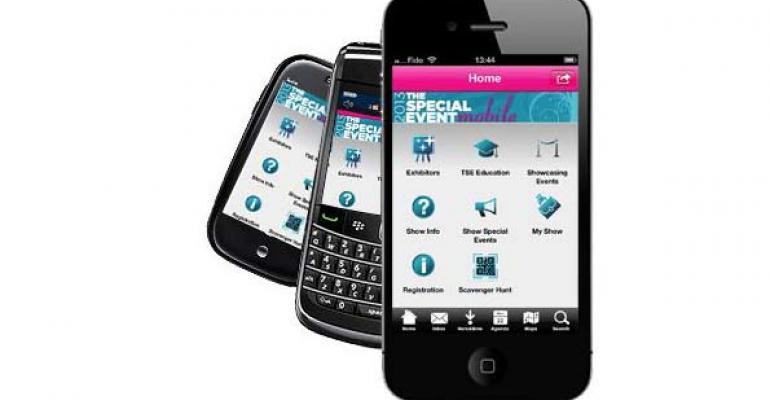Mobile apps are cool, mobile apps are hip. But mobile apps aren't widely used at events.
In a recent online survey from Special Events, less than 20 percent of respondents say they have created or commissioned mobile apps for their special events. In contrast, 73 percent say they have not created an app but want to someday, while the remaining 9 percent say they have never created an app and have not had a request to do so.
To be sure, some event planners have had success with event apps. For example, The Special Event 2013 provided an app for attendees at the show this month, and in our issue next week, we will share similar stories.
But with some 1.5 million apps on the market, why are apps for events such a challenge? Here, Chris Menard, head of sales and marketing for MobileIgniter of Boulder, Colo.--is a mobile app development platform--gives his perspective on the challenges:
Special Events Why don’t more companies produce mobile [AKA native] apps?
Chris Menard The answer is cost and confusion.
Cost is a function of complexity and confusion a function of demand. The skills needed to develop mobile apps are in short supply and as such are costly to acquire. The cost to produce an app for an event ranges from free to tens of thousands of dollars.
The free options normally have many restrictions and don't normally target to an individual event, but they are free.
There is a lot of competition in the $5,000 to $10,000 price range. Companies offering mobile apps in this range should meet the needs of most events, but this can be too expensive for some customers.
Over $10,000, customers can get pretty specific needs meet.
SE How big is the demand for mobile apps for events?
CM There is large demand for mobile apps for events. This has caused many app development companies to focus on this space, each of them offering a slightly different product with different pricing. I think the marketplace could be confusing to a company that is thinking about producing their first mobile app.
SE How long does it take to develp an app?
CM: Four to eight weeks, sometimes longer, but this is being shortened all the time. Apple takes between seven to 14 days to approve an app, and there is little companies can do to influence this process.
Most apps are approved the first time they are submitted, but not always.
10 Forecasts for Mobile Apps at Events
Two trends: Mobile platforms will cease to operate in isolation, and multi-event apps will supersede single event apps, the company says
As part of its "ongoing commitment to drive engagement technology into the events industry," GenieConnect--which creates event web portals and apps--has announced its top ten predictions for the mobile event app industry in 2013.
According to GenieConnect's operations director Michael Douglas, the top 10 trends are:
1. Mobile platforms will cease to operate in isolation. App providers will be expected to deliver a solution that is compatible with both web and tablets. This will become a standard requirement in 2013 as attendees realize the benefits of streaming and accessing information on all devices, from the desktop to any mobile device.
2. Events are going mobile and as a result, apps will become the norm at all events. Just as pre-registering for an event online has become standard, so will downloading event apps. Apps give attendees instant access to all of the event information that they need.
3. Customers will continue to expect greater return on investment from their event apps. The app will play a much greater role in the marketing arm of every product it is attached to, and all event apps will be expected to deliver direct business leads, audience insights and clear brand/message recognition.
4. Multi-event apps will supersede single event apps. Multi-event apps allow organizations to provide a single app, which can be used for multiple linked events, thus saving considerable time on the planning side. A multi-event app requires a one-time download from attendees, and serves as an ongoing resource center for information.
5. The quality of the solution and the service delivered to the client will trump the individual features. Too many event apps are poorly delivered and as a result, quality and service will become key selling points for app vendors.
6. Customers will look to reduce the number of tech suppliers.Customers are currently working with multiple suppliers for services such as website, registration, floor plan and audience response. Increasingly, customers are favoring vendors who can offer a more complete package.
7. Customers will begin to use the event intelligence gleaned from apps to grow their business. Event apps are not just a tool to benefit attendees; they also provide invaluable information for customers that can be used in the planning of future events. An app can produce information on effective marketing, enhanced event design, and segmented marketing.
8. Customers will better understand the difference between tablet and smartphone use around events and will seek solutions that distinguish between them. The consumption of various types of data--messages, PDFs, white papers and video--varies depending on the device used by attendees. Customers will have to adapt to this when planning their app by including smart-device marketing and segmentation.
9. Augmented reality will replace QR codes, as the experimental technology no one uses. Advancements in these technologies are allowing creative marketing ideas to become more of a reality.
10. Show floor tracking and the ability to understand movements of participants within the event. Increased flexibility and access to technology means that event organizers can now track and analyze movement patterns around their event.
Established in 2010, GenieConnect (formerly Genie Mobile) provides event participation solutions, offering insight and business intelligence to organizers and enhanced event experiences for their attendees.
In Part II, appearing in next week's Eventline, we will showcase case studies of successful event apps.





